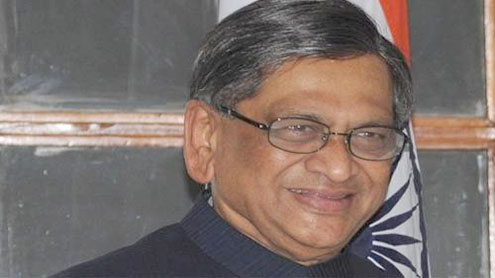
Indian Foreign Minister S M Krishna’s visit to Pakistan has yielded considerable progress in an agreement on a relatively liberalised visa regime and continuing discussions on a wide variety of issues outstanding between the two neighbours.
These issues include counter-terrorism (including progress on the Mumbai attacks trial), narcotics control, humanitarian issues, commercial and economic cooperation, water issues, Sir Creek, Siachen, Kashmir, etc. The relatively liberalised visa regime replaces the agreement dating from 1974. It opens up travel for businessmen, group tourism, pilgrimages, and visas-on arrival at Wagah-Attari for citizens over 65 years old. The number of cities or places allowed on visits have been increased, police reporting either exempted or made easier for various categories, time-bound visa processing instituted and multiple entry longer visas introduced, especially for businessmen.
Restrictions on entry/exit points have been loosened. All this is to be welcomed, but regretfully the agreement makes no mention of media or cultural troupes, both categories potentially important ambassadors of amity between the peoples of the two countries. Both Islamabad and New Delhi are urged to review this oversight.Another welcome development is the reiteration by both sides to cooperate in the struggle against terrorism, which threatens both countries.
The Mumbai attacks case also seems to be nudging forward in the direction of greater cooperation and closure. Interior Minister Rehman Malik requested the Indian side to allow another visit by a commission to gather evidence about the incident to facilitate the prosecution of the accused awaiting trial here. Cooperation on drug trafficking and interdiction was discussed and further meetings planned to implement measures cross-border.
Fishermen and others held prisoner for long excruciating periods in either country will be treated more humanely, allowed consular access and helped in repatriation with improved procedures. The Indus Waters Treaty will be adhered to and procedures for discussing problems improved. Sir Creek, Siachen and Kashmir were on the table, but it would take foolhardy optimism to think that such long standing intractable issues will yield solutions quite as easily or quickly as the list of nevertheless considerable achievements as a result of this visit, which hold the promise of further progress. Cross-LoC travel and trade are going to be eased, which counts as a significant confidence building measure. Those disappointed at lack of progress in the more difficult problems should conduct a reality check on their expectations.
The approach both sides have converged on is to tackle more easily doable areas first, create the necessary mutual confidence, and then move to the more substantive but far more difficult issues. This is an approach that has yielded dividends elsewhere, of particular note in this regard being the changed relationships between the US and China and India and China in recent years. Of significance are the respective statements of both foreign ministers after their deliberations.
Pakistani Foreign Minister Hina Rabbani Khar emphasised her side’s intent not to be held prisoner by history and to move relations forward in a positive direction. Indian External Affairs Minister S M Krishna expressed similar sentiments, notwithstanding his reiteration of New Delhi’s abiding concerns regarding the Mumbai attacks issue and Dr Manmohan Singh’s visit to Pakistan being subject to expectations of some substantive outcome. The suggestion to both sides is that of the more difficult issues, it is Sir Creek and Siachen that arguably could be resolved first.
If the two asides can find ways and means to find convergence and mutually acceptable solutions to these two issues, what better time for Dr Manmohan Singh to visit the land of his birth than at a time when agreements on these two issues would be ready for signing. Relations between the old foes linked by ties of geography, history, culture and many other shared values can be looked at in one of two ways: whether the glass is half-full or half-empty. Both descriptions carry a grain of truth, but neither is complete on its own. The progress made so far can be built upon to nudge both countries to a realisation of the dividends nestling in the lap of improved, if not friendly relations. – Dailytimes











